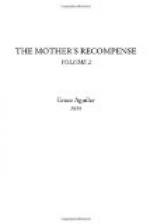“It is long I have heard the voice of kindness in my native tongue—long since English faces and English hearts have thus blessed me, and would you bid me leave them, my young friend?”
His mournful voice thrilled to Mrs. Hamilton’s heart, as he laid his hand appealingly on Edward’s arm.
“Not for worlds,” replied the young sailor, cheerfully. “Sir George Wilmot, my dear aunt, have you any recollection of my good friend here? he says he knew you both when he was a boy.”
Sir George Wilmot’s eyes had never moved from Mordaunt since he had withdrawn his attention from Edward, and he now replied somewhat gravely—
“Of the name of Mordaunt I have no recollection as being borne by any youngsters on board my ship, but those features seem strangely familiar to me. I beg your pardon, sir, but have you always borne that name?”
“From the time I can remember, Sir George; but this may perhaps convince you I have been on board your ship. Was there not one amongst us in the cockpit, a young lad whom you ever treated with distinguished favour, whom, however unworthy, you ever held up to his comrades as a pattern of all that was excellent in a seaman and a youth, whom you ever loved and treated as a son? I was near him when he flung himself in the sea, with a sword in his mouth, and entering the enemy’s ship by one of the cabin-windows, fought his way to the quarter-deck, and hauling down the French standard, retained his post till relieved by his comrades; and when the fight was over, hung back and gave to others the meed of praise you were so eager to bestow. Have you forgotten this, Sir George?”
“No!” replied the Admiral, with sudden animation. “Often have I recalled that day, one amongst the many in which my Charles distinguished himself.”
“And you told him he would rise to eminence ere many years had passed—the name of Delmont would rival that of Nelson ere his career had run.”




